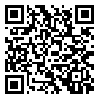1. Moshki M, Ghofranipoor F, Azad Fallah P, Hajizadeh E. Effect of an educational program with self-esteem and health control beliefs on mental health promotion of university students. KAUMS Journal (FEYZ). 2009;12(4):38-45. [Persian]
2. Taheri-Kharameh Z, Abdi M, OmidiKoopaei R, Alizadeh M, Vahidabi V, Mirhoseini H. The relationship between religious-spiritual well-being and stress, anxiety, and depression in university students. Health Spiritual Med Ethics. 2016;3(1):30-35.
3. Koenig HG, McCullough ME, Larson DB. Handbook of religion and health. Oxford University Press; 2001. [
DOI:10.1093/acprof:oso/9780195118667.001.0001]
4. Wachholtz A, Rogoff M. The relationship between spirituality and burnout among medical students. J Contemp Med Educ. 2013;1(2):83-91. http://doi.org/10.5455/jcme.20130104060612 [
DOI:10.5455/jcme.20130104060612]
5. Nejat S. Standardization quality of life questionnaire of the world health organization. Journal of the School of Public Health and Institute of Public Health Research. 2007;4(4):1-12. [Persian]
6. McSherry W, Cash K, Ross L. Meaning of spirituality: Implications for nursing practice. J Clin Nurs. 2004;13(8):934-941. [
DOI:10.1111/j.1365-2702.2004.01006.x] [
PMID]
7. Sorajjakool S, Aja V, Chilson B, Ramírez-Johnson J, Earll A. Disconnection, depression, and spirituality: A study of the role of spirituality and meaning in the lives of individuals with severe depression. Pastoral Psychology. 2008;56(5):521-532. http://doi.org/10.1007/s11089-008-0125-2 [
DOI:10.1007/s11089-008-0125-2]
8. Desrosiers A, Miller L. Relational spirituality and depression in adolescent girls. J Clin Psychol. 2007;63(10):1021-1037. http://doi.org/10.1002/jclp.20409 [
DOI:10.1002/jclp.20409]
9. Wachholtz A, Rogoff M. The relationship between spirituality and burnout among medical students. Journal of Contemporary Medical Education. 2013;1(2):83-91. http://doi.org/10.5455/jcme.20130104060612 [
DOI:10.5455/jcme.20130104060612]
10. Beck R. Comm:union: and complaint: attachment, object-relations, and triangular love perspective on relationship with God. Journal of Psychology and Theology. 2006;34(1):43-53. [
DOI:10.1177/009164710603400105]
11. Laurin K, Kay A C, Mosovitch DA. On the belief in God: Towards an understanding of the emotional substrates of compensatory control. Journal of Experimental Social Psychology. 2008;44(6):1559-1562. [
DOI:10.1016/j.jesp.2008.07.007]
12. Underwood LG, Teresi JA. The daily spiritual experience scale: development, theoretical description, reliability, exploratory factor analysis, and preliminary construct validity using health-related data. Annals of Behavioral Medicine. 2002;24(1):22-33. [
DOI:10.1207/S15324796ABM2401_04]
13. Taghavi M, Amiri H. Psychoanalysis characteristic investigation daily spiritual experience scale (DSES). Biquarterly Journal of Islamic Education. 2010;5(10):149-165. [Persian]
14. Goldberg DP, Gater R, Sartorius N, et al. The validity of two versions of the GHQ in the WHO study of mental illness in general health care. Psychol Med. 1997;27(1):191-197. [
DOI:10.1017/S0033291796004242] [
PMID]
15. Ebadi M, Harirchi AM, Shariati M, GarmaroudiGh, Fateh A, Montazeri A. Translation, reliability and validity of the 12-item general health questionnaire among young people in Iran. Payesh Journal. 2002;1(3):39-46. [Persian]
16. Lovibond SH, Lovibond PF. Manual for the Depression Anxiety Stress Scales. 2ed ed. Sydney, NSW: Psychology Foundation; 1995.
17. Asgharimoghaddam M, Saed F, Dibajnia, P, Zangeneh J. A preliminary validation of the depression, anxiety and stress scales (DASS) in non-clinical sample. CPAP. 2008;1(31):23-38. [Persian]
18. Safee Rad I, Karimi L, Shomoossi N, Ahmaditahor M. The relationship between spiritual wellbeing and mental health of university students. Journal of Sabzevar University of Medical Sciences. 2011;17(4):274-280. [Persian]
19. Papazisis G, Nicolaou P, Tsiga E, Christoforou T, Sapountzi-Krepia D. Religious and spiritual beliefs, self-esteem, anxiety, and depression among nursing students. Nursing & Health Sciences. 2014;16(2):232-238. http://doi.org/10.1111/nhs.12093 [
DOI:10.1111/nhs.12093]
20. Sanders PW, Allen GE, Fischer L, Richards PS, Morgan DT, Potts RW. Intrinsic religiousness and spirituality as predictors of mental health and positive psychological functioning in latter-day saint adolescents and young adults. Journal of Religion and Health. 2015;54(3):871-887. [
DOI:10.1007/s10943-015-0043-4] [
PMID]
21. Ghahremani N, Nadi M. Relationship between religious/spiritual components, mental health and hope for the future in hospital staff of Shiraz public hospitals. Iran Journal of Nursing. 2012;25(79):1-11. [Persian]

 , Vahid Khosravi1
, Vahid Khosravi1 
 , Tahereh Ramezani2
, Tahereh Ramezani2 
 , Alireza Alinoori *3
, Alireza Alinoori *3 
 , Khansanami Shabanali4
, Khansanami Shabanali4 
 , Fatemeh Sharififard5
, Fatemeh Sharififard5 






